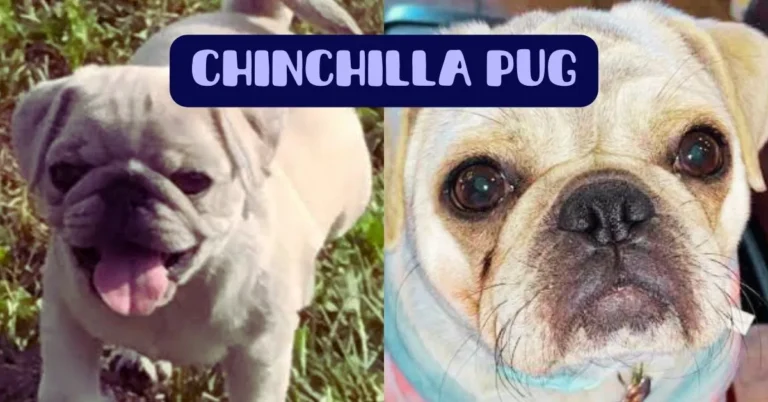Have you ever caught a glimpse of a chinchilla pug? Their coat color is a striking variation from the regular pug colors.
While you may be familiar with the unique white pugs or brown pugs, the chinchilla pug is even rarer to find.
It is important to note that the chinchilla pug is not a recognized standard in the official breed standards for pugs.
As a seasoned pug parent let me share with you to everything I have learnt about this pug breed.
So let us dive into the fascinating world of chinchilla pugs!
Chinchilla Pug
The pug chinchilla are pugs with a coat color or pattern that is similar to the soft, silvery-gray fur of a chinchilla .
If you are not aware, Chinchillas are medium-sized rodents found in South America known for their extremely soft and thick fur.
Unlike the more common black pugs and fawn pugs, the short and glossy coat of the chinchilla pug is a fascinating display and is one of the rare pug colors .
These pugs have a fawn or apricot base coat tipped with black or silver hairs.
This creates a shimmering, cooler-toned grayish appearance with a beautiful interplay of lighter and darker shades, mirroring the chinchilla’s fur.
Apart from the coat color they have all the features of a typical pug. Continue reading to know more about the pug chinchilla.
Pug Chinchilla
Like all other pugs, chinchilla colored pugs are small and sturdy, weighing 14-18 pounds and 10-13 inches tall at the shoulder.
They have a compact and square shaped body, wrinkled forehead, short snout and curly tail with large round expressive eyes.
Their ears are small and soft and can either be folded back (“rose”) or folded forward close to the head(“button”).
Read on to know their temperament and behavior.
Chinchilla pug puppies
Chinchilla pug, and all pugs in general, are loving and affectionate. They mingle well with kids and other pets, They thrive in love and attention.
The dogs ae playful and love to engage in activities and games. However they are brachycephalic and have moderate energy levels and may need frequent breaks during any physical activity.
Chinchilla colored pugs are intelligent and can be trained with patience and positive reinforcement, although they can be stubborn at times.
Finding chinchilla pug puppies may be a matter of chance because breeders generally don’t breed for this color.
Chinchilla Pug Breed
The Chinchilla pug breed share the same pug health problems just like any other color pug.
They have short snouts (brachycephalic) and hence may face breathing difficulties. They can also have eye problems like dry eye, cherry eye, proptosis or corneal ulcer.
Pugs skin are sensitive and hence may face several skin allergies and infections.
Their short face can have crowded teeth, leading to gum and dental issues if not cleaned properly.
They also tend to overeat leading to obesity which in turn leads to more health issues.
Chinchilla pugs, like other pure bred pug dogs, can be prone to health conditions. Responsible breeding practices are to be followed to minimize health risks.
Regular bath and grooming, health dog friendly diet, moderate exercise and time to time veterinary checkups and vaccinations are crucial for the heath and well being of your pug.
Here are some pictures of the chinchilla pug breed shared on Instagram.
Instagram post shared by @pearlthechinchillapug, @chinchillapug, @doris.chinchilla.pug and @doris.chinchilla.pug respectively
FAQ
What is a chinchilla pug?
Chinchilla pug is a variety of the popular pug breed dogs whose coat color resembles the rodent Chinchilla, hence the name. The coat of the Chinchilla pug is short, smooth and lustrous with different shades of gray creating a very fascinating sight.
What colour is a chinchilla pug?
A chinchilla pug has a fawn or apricot base coat tipped with black or silver hairs creating a shimmering gray effect like that of a Chinchilla.
Summing Up
The coat of chinchilla pug is one of the rare pug colors. These pugs are an unique and fascinating variation of the pug breed.
Their coat combined with their affectionate and playful personalities make them amazing companions.
But it is to be kept in mind that owning a pug is a huge responsibility. They need love and care and attention and their brachycephalic (short-nosed) nature may come with specific health needs.
On top of that finding a reputable breeder may need your research and patience. Avoid puppy mills where dogs are bred in poor conditions.
You can find reputable breeders through kennel clubs (AKC, PDCA), rescue organizations, or breed-specific online communities.
By following these guidelines and being ready for and a lifelong commitment, you can welcome a happy and healthy pug into your family.

